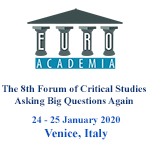Euroacademia Conferences
 Europe Inside-Out: Europe and Europeanness Exposed to Plural Observers (9th Edition) April 24 - 25, 2020
Europe Inside-Out: Europe and Europeanness Exposed to Plural Observers (9th Edition) April 24 - 25, 2020 Identities and Identifications: Politicized Uses of Collective Identities (9th Edition) June 12 - 13, 2020
Identities and Identifications: Politicized Uses of Collective Identities (9th Edition) June 12 - 13, 2020 8th Forum of Critical Studies: Asking Big Questions Again January 24 - 25, 2020
8th Forum of Critical Studies: Asking Big Questions Again January 24 - 25, 2020 Re-Inventing Eastern Europe (7th Edition) December 13 - 14, 2019
Re-Inventing Eastern Europe (7th Edition) December 13 - 14, 2019 The European Union and the Politicization of Europe (8th Edition) October 25 - 26, 2019
The European Union and the Politicization of Europe (8th Edition) October 25 - 26, 2019 Identities and Identifications: Politicized Uses of Collective Identities (8th Edition) June 28 - 29, 2019
Identities and Identifications: Politicized Uses of Collective Identities (8th Edition) June 28 - 29, 2019 The European Union and the Politicization of Europe (7th Edition) January 25 - 26, 2019
The European Union and the Politicization of Europe (7th Edition) January 25 - 26, 2019 7th Forum of Critical Studies: Asking Big Questions Again November 23 - 24, 2018
7th Forum of Critical Studies: Asking Big Questions Again November 23 - 24, 2018 Europe Inside-Out: Europe and Europeanness Exposed to Plural Observers (8th Edition) September 28 - 30, 2018
Europe Inside-Out: Europe and Europeanness Exposed to Plural Observers (8th Edition) September 28 - 30, 2018 Identities and Identifications: Politicized Uses of Collective Identities (7th Edition) June 14 - 15, 2018
Identities and Identifications: Politicized Uses of Collective Identities (7th Edition) June 14 - 15, 2018
From Barbaric Noise to Beloved Melodies – An Organ Grinder and Sonic Identity of the City in Nineteenth-Century Soundscape of Warsaw
-
-

-
Presentation speakers
- Marta Michalska, Faculty of History, University of Warsaw, Poland
- Download presentation
Abstract:
An organ grinder is an ambiguous figure in the soundscape of the nineteenth-century European city, yet quite a ubiquitous one. Although they are of different nationalities, these sonic urban nomads seem quite similar – male, impoverished, with an animal of some sort as a companion. The sound they produce marks the soundscape enough they ‘require’ to be analysed. Most of the time the sound, the melodies and the music of an organ grinder were considered a noise – loud, repetitive and of poor quality, they horrendously ‘travested’ popular opera hits of the time, they ‘contaminated’ the public sphere, and thus were something to be dealt with and regulated. Organ grinding aroused an array of negative feelings, from patronising contempt to utmost horror. The adequate language followed: ‘barbaric’ noise, ‘uncivilised’ sounds, rough music etc., and an absolute opposite of ‘art’, ‘music’ or ‘talent’. I would like, however, to focus on cases when an organ grinder was a welcomed guest and an anticipated visitor. Since my research project is about Warsaw at the turn of nineteenth and twentieth century, I will draw examples from this particular soundscape. Not surprisingly, the distinction of how the inhabitants would approach an organ grinder is of a class – the musician was a welcomed guest mostly in poor districts of Warsaw. They would usually enter the well-shaped yards of the Warsaw tenement houses and play – earning little money but much respect as they brought entertainment and culture to the toilsome everyday life. One more aspect is worth examining, which makes a Warsaw organ grinder different from, say, the London one: in the context of the city without autonomy under the Russian authority, an organ grinder – unintentionally, I guess – turned at times into a national hero, when playing religious songs and church antiphons.
-
Related Presentations

CRAFT – An EU Strategic Partnership that Works with the History, Heritage and Urban Change of Venice
- Anna Marie Fisker
- Anna Eva Utke Heilmann













